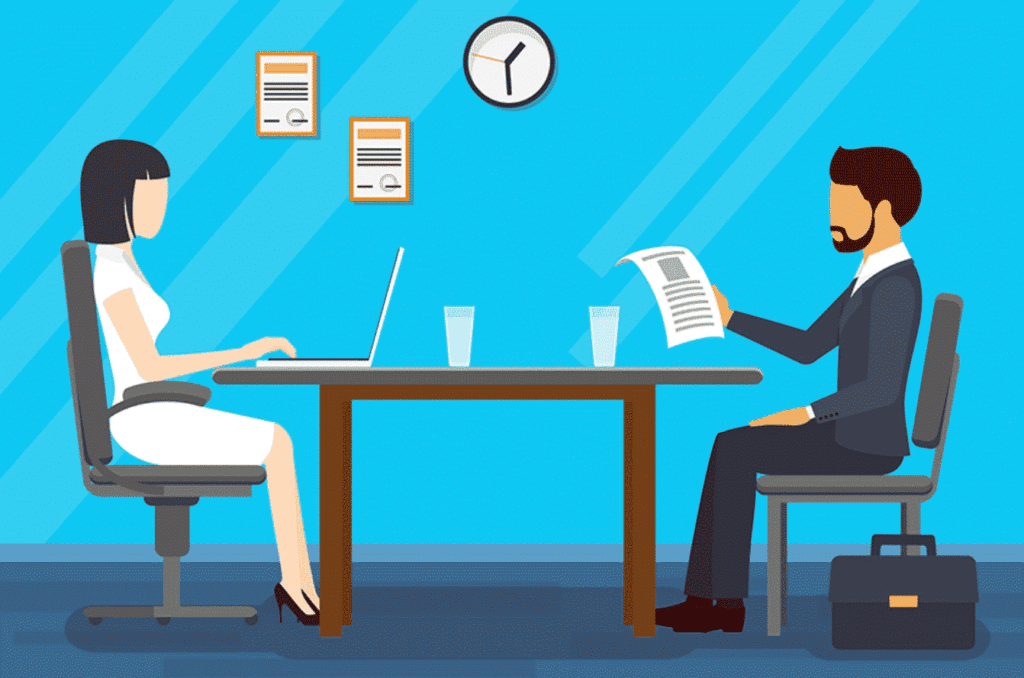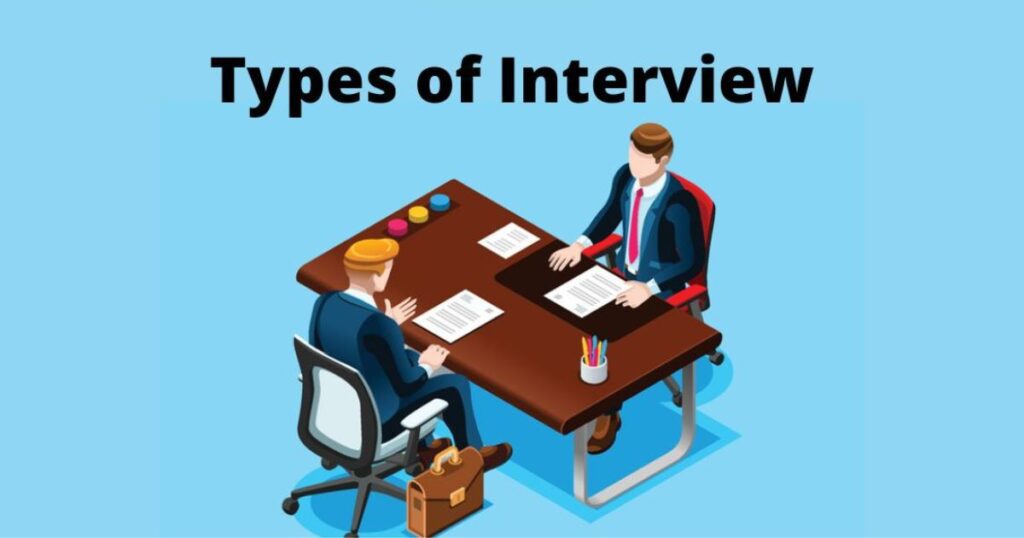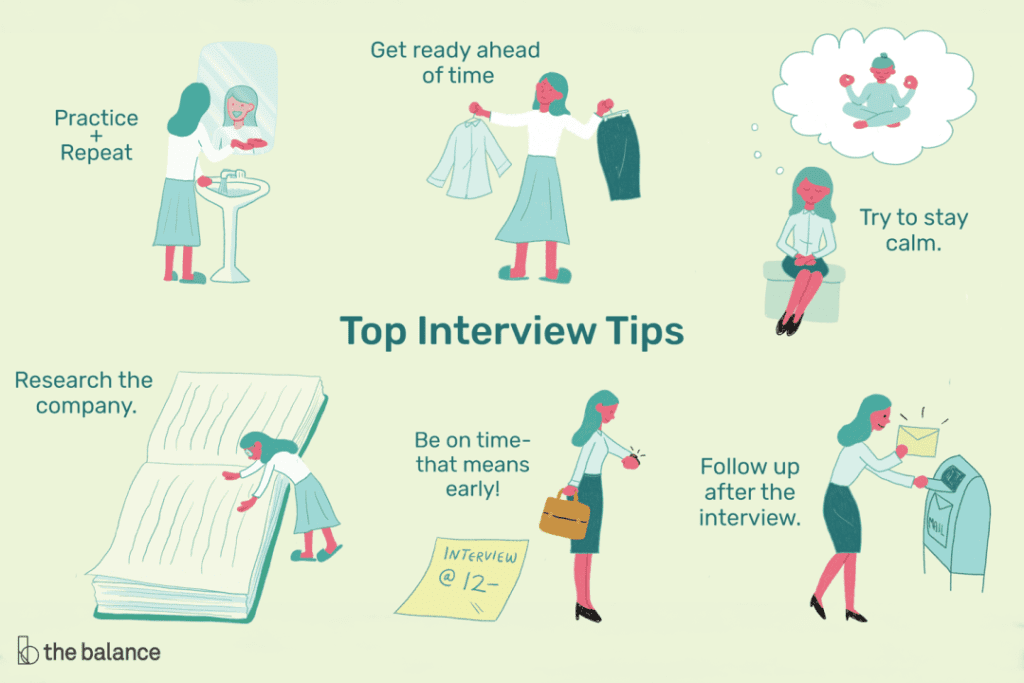Interview Preparation Tips

Interview preparation is the strategic process of readying oneself to present their skills, experiences, and personality effectively to prospective employers or academic institutions. Their are many Interview Preparation Tips that you may know so that you can get a job.
Types of Interview:
Table of Contents
Toggle
There are different types of job interview. In some cases, you’ll only need to succeed at one of these to land the role. In others, particularly at large graduate employers, you may face several interview formats throughout the application process.
Traditional Face-to-Face Interview:
This is the most common type where the candidate meets with one or more interviewers in person. It allows for direct interaction and the opportunity to assess non-verbal cues. The traditional and still most common form of interview. You’ll attend the employer’s office and be questioned on your suitability for the job by an individual or panel.
Phone Interview:
Conducted over the phone, this type of interview is often used as an initial screening to assess basic qualifications and interest before inviting candidates for an in-person interview. often used by employers early in the application process to filter large numbers of applicants. If you’re successful, you’ll typically be invited to a face-to-face interview or assessment center. Expect a telephone interview to last around half an hour.
Video Interview
Increasingly popular, especially for remote positions or initial screenings, video interviews are conducted via platforms like Zoom, Skype, or Google Meet. They mimic face-to-face interviews but are conducted virtually. Increasingly popular among large employers, particularly for applications to graduate schemes. Video interviews can be live or pre-recorded and tend to last around half an hour.
Tips to Follow During the Interview for Preparation

After preparing for the interview, you can be successful by following the tips below:
- Arrange your Interview Dress the Night before
- Bring your Resume Copies, a Pen and a Notebook
- Make your Schedule to Arrive 10 to 15 Minutes early
- Leave a Positive First Impression
- Respect Everyone you Meet
- Speak Positively about your Former Employers
- Be Confident
- Be Positive and Authentic
- Be Truthful in your Answers
- Relate your answers to your Accomplishments and Skills
- Be concise and focused in your answers
What to Wear to an Interview

What you wear to an interview plays a significant role in making a positive first impression. While many employers expect candidates to dress smartly, a growing number encourage casual wear at work, making it trickier than ever to choose an interview outfit.
What you’ll be expected to wear depends on factors such as the size of the company, the industry it operates in and the culture it promotes. For example, a small creative agency may have different standards to a major accountancy firm.
If you’re unsure on the dress code, ask before attending the interview. The key point to remember is that it’s better to be too smart than too casual. Only opt for a more casual outfit if you’re certain that’s acceptable – if there’s any doubt, go for smart business attire. Whatever you choose, make sure that your clothes are ironed and your shoes are clean.
Some Ways to make a Good Impression in an Interview for Preparation

As you’re preparing for the interview, think about ways you can show yourself in a positive light:
1) Punctuality:
Arriving late will increase your stress levels and give the employer a bad first impression, so do your best to arrive in good time. Plan to arrive 10-15 minutes early to the interview location.
This shows respect for the interviewer’s time and gives you a chance to compose yourself before the interview.
2) Positivity and Enthusiasm:
Be polite and professional with any staff you meet before or after the interview and, if you’re feeling particularly nervous, remind yourself that the worst thing that could happen is not getting the job. During the interview, respond to questions with positive statements, be enthusiastic about the job and avoid badmouthing your previous employers or university tutors.
3) Body Language
Body Language give a firm handshake to your interviewer(s) before and after the session. Once you’re seated, sit naturally without slouching in your chair or leaning on the desk. Throughout the interview, remember to smile frequently and maintain eye contact. Smile genuinely and exhibit positive body language throughout the interview.
4) clarity:
Answer all questions clearly and concisely, evidencing your most relevant skills, experiences and achievements. It’s acceptable to pause before answering a difficult question to give yourself thinking time, or asking for clarification if you’re unsure what a question means. When answering, don’t speak too quickly.
5) Be Confident and Positive:
With being confident and positive can put a good impact. Display confidence in your abilities without being arrogant. Speak clearly and concisely, and maintain a positive attitude even if you encounter challenging questions.
6) Showcase Adaptability and Problem-Solving Skills:
Be prepared to discuss how you’ve handled challenges or difficult situations in previous roles. Demonstrate your ability to adapt, learn, and problem-solve effectively.
What to take in an Interview
- Photo ID
- Water Bottle
- Pen and Notebook
- Academics Certificates
- CV and Interview Invitation
- Money for Transport and Food
In addition, for online interviews you may also need:
- Laptop
- Microphone
- Headset/ Earphones
- Log in for the Software you need to use
